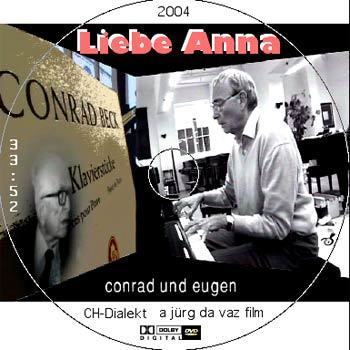049b / LIEBE ANNA
Movies
MOV5843-CH_2004-ADH0001
Unikum
Sony PD 150 / PD 170
divicam/digibeta
Lugano
Schweiz
Swiss Dialect Edition
views 90
http://www.youtube.com/watch?v=t6YvdmcGdo8&feature=youtu.be
«Liebe Anna», swissportrait, Lugano 2004, Darsteller Prof.Dr.med.Eugen Beck, ein JÜRG DA VAZ film, Vermächtnis an Anna.
Eugen Beck, Haematologe sitzt am Küchentisch und erzählt. Er ist nicht nur Mediziner, sondern auch Künstler. Virtuos spielt er Musik von Conrad Beck, seinem Vater und blättert dabei jeweils in Gedanken in der Fotosammlung seines Grossvaters in Ägypten. Sein Klavierspiel, das aus dem Schoss der Familie kommt, lässt die familiäre Herkunft gleichzeitig als Chance, aber auch als erbliche Belastung aufscheinen. Einfühlsam zeigt der Film, wie sich Eugen Beck an seine reiche Familientradition erinnert und gleichsam als Arzt immer wieder von neuem gefordert ist: 1961 seine medizinische Entdeckung über Wundheilung (Einfluss des neu entdeckten "Fibrin Stabilisernden Faktors" - der später Faktor XIII - auf das Wachstum von Fibroblasten in Kultur, Thrombos. Diathes. Haemorrh. (Stuttg.) 6:485-491, 1961), dann die Professur an der Universität Bern und anschliessend die Spezialarztpraxis in Lugano. Dabei blieb er stets seinem Imperativ treu: Dem menschlichen Kontakt und der Konfrontation mit dem Leiden. Anna, seine Tochter aus 2.Ehe ist im Film sichtbar abwesend. Scheinbar streift sie nur am Rand die Geschichten ihres Vaters.
But to me it seemed that Anna's existence had a metaphysical touch. Her aura was the eyeball of Eugen's spirit though nothing was visible and he wouldn't talk about it. She was everything he considered important. She was his lifeline back to his mother and grandmother, a life in Egypt with her tragic death in the Nile river.
Von den schwarzen Flecken auf Urgrossmutters Gemälde unberührt, trägt sie am Ende des Dokumentarfilms über ihren Vater das «Vermächtnis eines rastlosen Liebhabers» über die Schwelle ihres Zuhauses in eine unbeschwerte Zukunft.
piano: EUGEN BECK
cello ELENA SCHWARZ
camera 1/2/3 JÜRG DA VAZ
schnitt ZSOLT BENEDEK
regie und produktion JÜRG DA VAZ
Aufnahmen im Musikhaus Bottega del Pianoforte, Lugano und in der Küche der Familie Beck, Via Crocetta in Viganello, Schweiz
dokumentarfilm, eyesharpener©2004
Dear Mr. Da Vaz,
Thank you so much for sending me a copy of the film "Liebe Anna" that you produced about Eugen Beck. I was pleased to hear that you received a positive response to it from around the world, even more so because I liked it very much too, especially in the special and sensitive light it shed on the theme while remaining always witty and amusing. With regards Elena Schwarz Lugano, February, 2005
“Ist Kunst das Spiel, was vom Verlauf der Zeit als nicht-definierbares Herzstück übrigbleibt?“ Following a short term arrangement I met Professor Dr. Eugen Beck, son of the famous swiss composer Conrad Beck (“Tod zu Basel“) in his apartment in Lugano. Delayed because of traffic problems at the Gotthard I arriverd for the shooting at 2 o’clock in the early morning and to a Spaghetti dish which Eugen Beck served at in the early morning hours. Nothing had been discussed beforehand nor had the interview been prepared. All happened as it developed. Waking up early we had breakfast in the kitchen under grandmothers Egyptian painting. Then Eugen Beck took me to the Musikhaus Bottega del Pianoforte in Lugano where he had a variety of pianos at his disposal. Together with Elena Schwarz at the cello, he played his fathers music as well as of other composers of his choice . Reaching way back into the end of the 19th century, the trails of the Beck family appear, fragmented and in veiled language transported by the music of his searching hand. And when language clearly shows its limits, it is the inner creative urge of Eugen Beck that transforms his message into a form of art that supersedes technical perfection.
Jürg Da Vaz
http://www.youtube.com/watch?v=t6YvdmcGdo8&feature=youtu.be
«Liebe Anna», swissportrait, Lugano 2004, Darsteller Prof.Dr.med.Eugen Beck, ein JÜRG DA VAZ film, Vermächtnis an Anna.
Eugen Beck, Haematologe sitzt am Küchentisch und erzählt. Er ist nicht nur Mediziner, sondern auch Künstler. Virtuos spielt er Musik von Conrad Beck, seinem Vater und blättert dabei jeweils in Gedanken in der Fotosammlung seines Grossvaters in Ägypten. Sein Klavierspiel, das aus dem Schoss der Familie kommt, lässt die familiäre Herkunft gleichzeitig als Chance, aber auch als erbliche Belastung aufscheinen. Einfühlsam zeigt der Film, wie sich Eugen Beck an seine reiche Familientradition erinnert und gleichsam als Arzt immer wieder von neuem gefordert ist: 1961 seine medizinische Entdeckung über Wundheilung (Einfluss des neu entdeckten "Fibrin Stabilisernden Faktors" - der später Faktor XIII - auf das Wachstum von Fibroblasten in Kultur, Thrombos. Diathes. Haemorrh. (Stuttg.) 6:485-491, 1961), dann die Professur an der Universität Bern und anschliessend die Spezialarztpraxis in Lugano. Dabei blieb er stets seinem Imperativ treu: Dem menschlichen Kontakt und der Konfrontation mit dem Leiden. Anna, seine Tochter aus 2.Ehe ist im Film sichtbar abwesend. Scheinbar streift sie nur am Rand die Geschichten ihres Vaters.
But to me it seemed that Anna's existence had a metaphysical touch. Her aura was the eyeball of Eugen's spirit though nothing was visible and he wouldn't talk about it. She was everything he considered important. She was his lifeline back to his mother and grandmother, a life in Egypt with her tragic death in the Nile river.
Von den schwarzen Flecken auf Urgrossmutters Gemälde unberührt, trägt sie am Ende des Dokumentarfilms über ihren Vater das «Vermächtnis eines rastlosen Liebhabers» über die Schwelle ihres Zuhauses in eine unbeschwerte Zukunft.
piano: EUGEN BECK
cello ELENA SCHWARZ
camera 1/2/3 JÜRG DA VAZ
schnitt ZSOLT BENEDEK
regie und produktion JÜRG DA VAZ
Aufnahmen im Musikhaus Bottega del Pianoforte, Lugano und in der Küche der Familie Beck, Via Crocetta in Viganello, Schweiz
dokumentarfilm, eyesharpener©2004
Dear Mr. Da Vaz,
Thank you so much for sending me a copy of the film "Liebe Anna" that you produced about Eugen Beck. I was pleased to hear that you received a positive response to it from around the world, even more so because I liked it very much too, especially in the special and sensitive light it shed on the theme while remaining always witty and amusing. With regards Elena Schwarz Lugano, February, 2005
“Ist Kunst das Spiel, was vom Verlauf der Zeit als nicht-definierbares Herzstück übrigbleibt?“ Following a short term arrangement I met Professor Dr. Eugen Beck, son of the famous swiss composer Conrad Beck (“Tod zu Basel“) in his apartment in Lugano. Delayed because of traffic problems at the Gotthard I arriverd for the shooting at 2 o’clock in the early morning and to a Spaghetti dish which Eugen Beck served at in the early morning hours. Nothing had been discussed beforehand nor had the interview been prepared. All happened as it developed. Waking up early we had breakfast in the kitchen under grandmothers Egyptian painting. Then Eugen Beck took me to the Musikhaus Bottega del Pianoforte in Lugano where he had a variety of pianos at his disposal. Together with Elena Schwarz at the cello, he played his fathers music as well as of other composers of his choice . Reaching way back into the end of the 19th century, the trails of the Beck family appear, fragmented and in veiled language transported by the music of his searching hand. And when language clearly shows its limits, it is the inner creative urge of Eugen Beck that transforms his message into a form of art that supersedes technical perfection.
Jürg Da Vaz




